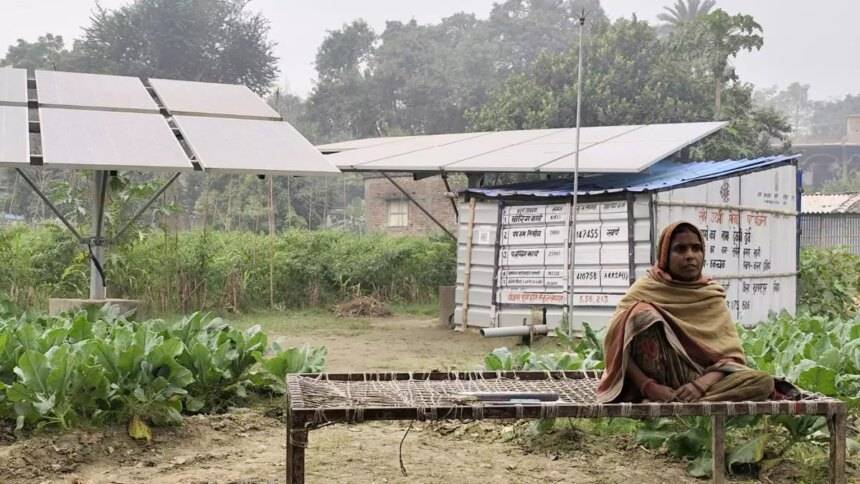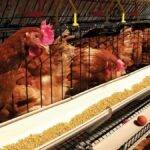Main Points In Hindi (मुख्य बातें – हिंदी में)
-
सौर ऊर्जा से जीवन में परिवर्तन: बिहार के मुजफ्फरपुर जिले की महिलाएं, देवकी देवी और सुनीता देवी, ने सौर ऊर्जा सिंचाई अपनाकर अपने जीवन को बदल दिया है। अब वे अपने गांव की "सोलर दीदियों" के रूप में जानी जाती हैं और छोटे किसानों को सस्ती सिंचाई सेवाएं प्रदान कर रही हैं।
-
गैर सरकारी संगठनों की भूमिका: आगा खान रूरल सपोर्ट प्रोग्राम इंडिया (AKRSP), जीविका, और गेट्स फाउंडेशन जैसे संगठनों ने इन महिलाओं को सौर पंप स्थापित करने में सहायता की है, जिससे 3,000 से अधिक छोटे किसानों को लाभ हुआ है।
-
सिंचाई लागत में कमी: सौर पंपों द्वारा जल आपूर्ति की लागत कम है ( ₹25-35 प्रति कट्टा), जबकि डीजल और बिजली पर निर्भरता अधिक महंगी है, जिससे किसान बेहतर फसल उत्पादन की दिशा में बढ़ रहे हैं।
-
स्व-सहायता समूहों का समावेश: सौर पंपों का संचालन करने के लिए चुनी गई महिलाओं को स्व-सहायता समूहों का हिस्सा होना अनिवार्य है, जिसने उनकी आर्थिक स्थिति को मजबूत किया है और उन्हें अपने परिवारों के लिए विशेष योगदान देने का अवसर प्रदान किया है।
- महिलाओं को आर्थिक सशक्तिकरण: ये महिलाएं न केवल अपनी आय में वृद्धि कर रही हैं, बल्कि अपने बच्चों की शिक्षा और पोषण में भी अधिक निवेश कर रही हैं, जिससे समग्र मानव विकास पर सकारात्मक प्रभाव पड़ रहा है।
Main Points In English(मुख्य बातें – अंग्रेज़ी में)
Here are the main points from the article about the impact of solar energy irrigation on women farmers in Bihar:
-
Transformation of Women’s Lives: Devaki Devi and Sunita Devi, once struggling homemakers in Muzaffarpur, Bihar, have transformed their lives by adopting solar energy irrigation. Their decision significantly improved their daily living conditions and empowered them as entrepreneurs in their community.
-
Role of NGOs: Over 90 women entrepreneurs in the Bochha area have had their lives changed by solar irrigation, with support from various NGOs, including the Aga Khan Rural Support Program and the Gates Foundation. These women are providing affordable water supply to more than 3,000 smallholder farmers in the region.
-
Cost-Effectiveness of Solar Irrigation: The shift to solar-powered pumps has led to lower irrigation costs (₹25-35 per "katta") compared to diesel and electric pumps. This improvement enables farmers to secure timely irrigation, enhancing crop yield and quality.
-
Diverse Crop Cultivation: With guaranteed water supply from solar pumps, farmers are transitioning from traditional food crops to cash crops, particularly in horticulture. This trend is projected to accelerate in the future.
- Empowerment and Sustainable Development: The initiative not only promotes women’s income and representation in agricultural enterprises but also contributes to a low-carbon economy. It positively influences child nutrition, health, and education due to the increased financial capability of women.


Complete News In Hindi(पूरी खबर – हिंदी में)
दो साल पहले, बिहार के मुजफ्फरपुर जिले के बोचचा तहसील के रतनपुरा गांव में देवकी देवी एक साधारण गृहिणी थीं। उसके परिवार को भोजन सहित अपनी दैनिक जरूरतों को पूरा करने के लिए संघर्ष करना पड़ा।
इसी तहसील के करणपुर दक्षिण पंचायत के भगवानपुर दढिया की सुनीता देवी परिवार और मवेशियों की देखभाल के लिए घर तक ही सीमित थीं। दोनों महिलाओं का जीवन अब हमेशा के लिए बदल गया है।
देवकी और सुनीता को आज “सोलर” के नाम से जाना जाता है दीदियों“उनके गांव में. 2023 में सौर ऊर्जा सिंचाई अपनाने के उनके निर्णय ने उनके जीवन को बदल दिया है और वे अब अपने पिछले डेढ़ वर्षों के लाभ को आगे बढ़ाना चाह रहे हैं।
गैर सरकारी संगठनों की भूमिका
ये सिर्फ ये दो महिलाएं नहीं हैं. बोचा तालुक में 90 से अधिक ऐसी महिला उद्यमी हैं जिनका जीवन सौर ऊर्जा सिंचाई की आपूर्ति से बदल गया है। बदले में, वे अपने तालुक में 3,000 से अधिक छोटी जोत वाले किसानों के जीवन में रोशनी लाने की कोशिश कर रहे हैं।
“तालुक में 3,000 से अधिक छोटे किसान इन सौर ऊर्जा से लाभान्वित हो रहे हैं दीदियों. एकेआरएसपी के टीम लीडर मुकेश चंद्रा ने कहा, आगा खान रूरल सपोर्ट प्रोग्राम इंडिया (एकेआरएसपी), जीविका, माइक्रो-फाइनेंस फर्म रंग दे, एक्सिस बैंक और गेट्स फाउंडेशन जैसे गैर-सरकारी संगठन इस पहल के पीछे हैं।
ये महिलाएं आसपास के खेतों में किसानों को प्रतिस्पर्धी दरों पर पानी की आपूर्ति करती हैं। “बिहार एक ऐसा राज्य है जहां किसानों के पास एक कट्टा या दो कट्टा जैसी बहुत छोटी जोत होती है। (एक कट्टा एक एकड़ का 1/20वाँ भाग होता है)। ऐसी भूमि पर किसानों के लिए सिंचाई की सुविधा होना कठिन है। इसलिए, वे पड़ोसी किसानों से कीमत लेकर खरीदते हैं, ”चंद्रा ने कहा।
पांच साल पहले, जब बिजली अनुपलब्ध थी, तो किसानों ने डीजल सेट का उपयोग करके पंप किया हुआ पानी खरीदा। उसके बाद, उन्होंने बिजली से चलने वाले पंपों की ओर रुख किया। AKRSPI टीम लीडर कहते हैं, “आज, लोगों ने सौर पंप सिंचाई पर ध्यान देना शुरू कर दिया है, जो न केवल प्रतिस्पर्धी है बल्कि समय पर सिंचाई करने से फसलों की उपज और गुणवत्ता में सुधार होता है।”
अन्य फसलों पर स्विच करें
डीजल पंपों से आपूर्ति किए जाने वाले पानी की लागत ₹150-200 प्रति घंटा है और बिजली से चलने वाले पंपों से आपूर्ति की लागत ₹120-150 है। “मैं प्रति घंटे ₹100 चार्ज करता हूं। इससे 3-4 सिंचाई हो सकती है कट्टा एक घंटे में,” देवकी ने कहा।
देवकी देवी
यह प्रति कट्टा ₹25-35 बैठता है जबकि बिजली से चलने वाले पंपों के लिए ₹60 और डीजल से चलने वाले पंपों के लिए ₹75 होता है। “डीजल या बिजली से चलने वाले पंप 3 हॉर्स पावर के होते हैं लेकिन ये सोलर पंप 5 हॉर्स पावर के होते हैं। इसलिए, वे अधिक पानी की आपूर्ति करते हैं। इसके अलावा, किसानों को बिजली कटौती के बारे में चिंता करने की ज़रूरत नहीं है, ”चंद्रा ने कहा।
गारंटीकृत जल आपूर्ति के कारण अब किसान धान, मक्का और अन्य खाद्यान्न फसलों के बजाय नकदी फसलों, विशेषकर बागवानी की ओर रुख कर रहे हैं। AKRSP टीम लीडर का कहना है, ”आने वाले दिनों में बदलाव तेज़ होगा।”
सोलर पंप सिंचाई स्थापित करने के लिए प्रत्येक महिला को कम से कम ₹6 लाख का प्रारंभिक निवेश करना होगा। इसमें से, गेट्स फाउंडेशन सौर जल पंपों की आपूर्ति करके ₹3 लाख की देखभाल करता है। चंद्रा कहते हैं, “बाकी काम बोरवेल खोदना, पानी खरीदने वाले किसानों की जमीन तक पाइपलाइन बनाना, पंप और उसके ऑपरेटर के लिए शेड बनाना है।”
देवकी के लिए एक रिश्तेदार ने 10 प्रतिशत ब्याज पर ₹50,000 का ऋण दिया। सुनीता ने अपनी बचत से ₹50,000 से अधिक का प्रबंधन किया। फिर उन्हें रंग दे से ऋण मिला, जो 8 प्रतिशत ब्याज पर ऋण प्रदान करता है, और जिस स्वयं सहायता समूह से वे संबंधित हैं।
चयन मानदंड
“सौर पंप सिंचाई चलाने के लिए महिला उद्यमियों को चुनने के लिए हमारे पास कुछ मानदंड हैं। उनके पास दो एकड़ से अधिक भूमि नहीं होनी चाहिए और उन्हें स्वयं सहायता समूहों का हिस्सा होना चाहिए। पहले, हम ऐसी महिला उद्यमियों की तलाश कर रहे थे, अब वे हमारी तलाश में आती हैं, ”चंद्रा ने कहा।
इस लक्ष्यीकरण ने देवकी को, जिनके पति एक चित्रकार हैं, अपने बच्चों को ट्यूशन भेजने में मदद की है, जबकि सुनीता, जिनके पति एक किसान हैं, ने अपने पोते-पोतियों को निजी स्कूलों में पढ़ाया है। इससे भी अधिक वे इस बात से खुश हैं कि उनके परिवारों को उनकी कीमत का एहसास हुआ है और उनके पतियों ने उनसे परामर्श करना या उनकी मदद करना शुरू कर दिया है।
इसके अलावा, सुनीता का परिवार बायोगैस का उपयोग करता है (गोबर गैस) जिसका स्रोत मवेशी हैं। इससे एलपीजी गैस के उपयोग को दो से घटाकर एक सिलेंडर करने में मदद मिली है। देवकी ने अपनी पाइपलाइन की लंबाई 500 मीटर अतिरिक्त बढ़ा दी है, जबकि सुनीता ने 800 मीटर अतिरिक्त।
गैर सरकारी संगठनों और गेट्स फाउंडेशन के लिए, यह कम कार्बन विकास में परिवर्तन और “हरित नौकरियों” को जोड़ने में मदद करता है। हरित नौकरियों में महिलाओं का प्रतिनिधित्व बढ़ने से कम कार्बन और पर्यावरण की दृष्टि से टिकाऊ अर्थव्यवस्था को बढ़ावा देने जैसे लाभ होंगे।
महिलाओं के हाथों में अधिक आय देने से सामान्य मानव विकास के लिए लाभकारी परिणाम मिलते हैं, क्योंकि वे बच्चों के पोषण, स्वास्थ्य और शिक्षा में अधिक निवेश करती हैं।
Complete News In English(पूरी खबर – अंग्रेज़ी में)
Two years ago, Devki Devi was an ordinary housewife living in the village of Ratanpura in the Muzaffarpur district of Bihar. Her family struggled just to meet their daily needs, including food. Similarly, Sunita Devi, from the nearby Bhagwanpur Dadiya village, was confined to her home, taking care of her family and livestock. Both women’s lives changed dramatically when they decided to adopt solar energy irrigation systems.
Today, Devki and Sunita are recognized as “Solar Didis” in their village. Their decision to implement solar energy for irrigation in 2023 has transformed their lives, and now they wish to expand on the benefits they have experienced over the past year and a half.
These two women are not alone; there are over 90 female entrepreneurs in the Bochha region whose lives have been positively impacted by solar energy irrigation. In turn, they are working to improve the lives of more than 3,000 small farmers in their area. Mukesh Chandra, the team leader from the Aga Khan Rural Support Programme India (AKRSPI), mentions that these women provide water to nearby farmers at competitive rates, with support from NGOs like Jeevika, Rang De, Axis Bank, and the Gates Foundation.


Historically, farmers in Bihar faced challenges with irrigation due to their small landholdings—often less than an acre. To access water, they previously relied on diesel pumps, but today, many are switching to solar-powered pumps, which not only lower costs but also improve crop yield and quality due to timely irrigation.
The cost to supply water from diesel pumps ranges from ₹150-200 per hour, while electric pumps cost ₹120-150. In contrast, solar pumps charge only ₹100 per hour, enabling multiple irrigations within that time. This shift allows farmers to grow cash crops, especially in horticulture, rather than just staple crops like rice and corn.
Each woman entrepreneur needs an initial investment of at least ₹6 lakh to set up solar irrigation. The Gates Foundation assists by providing solar water pumps worth ₹3 lakh. The remaining funds are used for drilling borewells, creating pipelines to farmers’ fields, and constructing shed facilities for the pumps and their operators.
Devki received a loan of ₹50,000 at a 10% interest rate from a relative, while Sunita managed more than ₹50,000 from her savings and secured additional loans from Rang De at 8% interest through their self-help group.
To select women for solar pump irrigation, criteria include not owning more than two acres of land and being part of self-help groups. This approach has empowered Devki, whose husband is a painter, to send her children for tutoring, while Sunita has enrolled her grandchildren in private schools. Their families also appreciate their contributions now, often consulting them for decisions.
Moreover, Sunita’s family utilizes biogas from their livestock, cutting their LPG usage from two cylinders to one. Meanwhile, Devki has extended her pipeline by an additional 500 meters, and Sunita by 800 meters.
For NGOs and the Gates Foundation, this initiative ties into promoting low-carbon development and creating “green jobs,” benefitting the economy while enhancing women’s representation in the workforce. Increasing women’s income leads to better outcomes in human development, particularly in child nutrition, health, and education.
Source link








